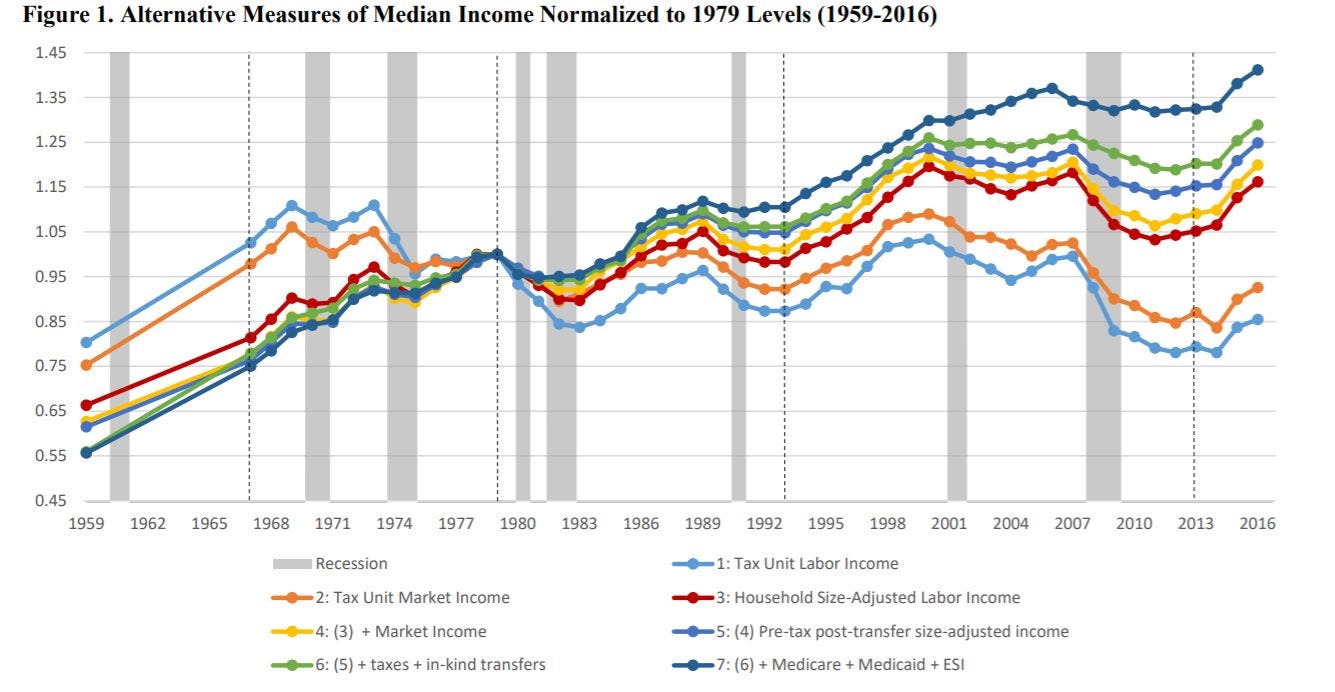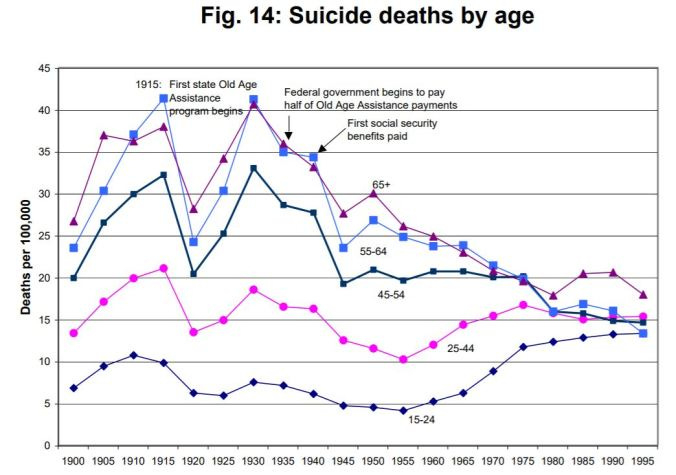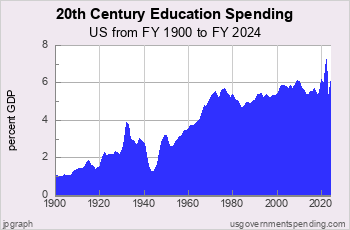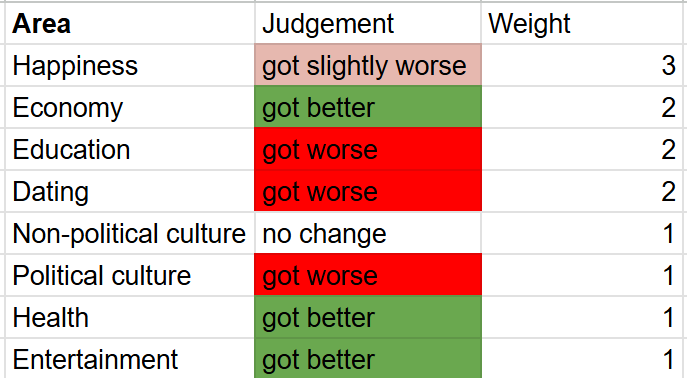TL;DR
The debate as to whether life was better in the 50s in comparison to now is not fun to watch, and largely consists in people throwing emotions at each other. People who like the 50s typically post Norman Rockwell art with no logical arguments. Then, advocates of the modern day accurately portray traditionalists as being motivated by nostalgia, but have little to say beyond that. Anybody trying to be reasonable gets drowned out by noise.
The economy is the most contested aspect of the debate. It’s complicated by the fact that there is not one measure of “living standard” that can be trusted: changes in mean income could reflect changes in hours or inflation, for example. They could even reflect changes in how inflation is measured.
As a starting point, median incomes in the United States have stagnated:

…Unless one accounts for household size, tax transfers, and government transfers. I assume that people would rather earn $40k through their own labour than $40k through the government, but, as the saying goes, 20 dollars is 20 dollars. This increase also cannot be blamed on changes in working hours, as Americans work less hours today than they did in the past.
Not only do people have more money now, they can also buy better things with it: computers and smartphones exist, cars are getting better, and black markets are easier to access because of the internet.
It is true that housing, for example, has gotten more expensive1, though this is factored into inflation — Americans spend about 25% of their income on housing and it is accordingly given a weight of 33% in the calculation of the CPI (inflation).
Why this isn’t that important
It’s better to have more money according to common sense as well as rich people, if you ask them nicely. This could be due several factors: money causing the acquisition for resources, higher social status, better mates2, and/or higher levels happiness3. At a collective level, more wealth causes more resources, but the effects of wealth on social status and mating success only occur at the individual level. It’s not clear if the effect of wealth on happiness occurs at a collective level, though I suspect it does.
There’s also the issue that the career ladder has gotten more tiring to climb for newer generations. The application grind has gotten bad for colleges, but it’s even worse in the job market. Online applications have made it easier to grind applications, a Moloch which has made it so the average white collar job is being competed over by hundreds of applicants. Then, if they want a job, they send another wave of… Maybe 100-500 applications.
One might think that it’s the losers who are fed up with an increasingly competitive and selective system, when actually it’s the winners, the people who tried to get into or went to elite schools, finished undergrad, and want a job who are complaining. Incels and NEETs are just chilling at home.
As such, when evaluating the quality of a society over time, other variables need to be assessed beyond the economy, such as happiness, the education system, dating, culture, politics, health, and entertainment. In order of importance:
Happiness

Stated happiness in the United States has sightly decreased in both sexes, moreso in women. Revealed happiness, measured by suicide rates, have been roughly the same ever since the 50s.

There is a nuance: rates have risen in the youth and decreased in the old.

Although he does not make this explicit, Sean Last seems to think that the suicide rate changes in the elderly are driven by finances, while the rates in the youth are driven by unhappiness. An alternative hypothesis is that life is getting worse for the youth and better for the elderly, even beyond finances. A lot of things that have worsened over time (e.g. dating, political culture, education) are things that primarily affect younger people, while things that have gotten better (e.g. health) are things that are more important for older people.
The American Education System
Is unquestionably worse in comparison to what it was 70 years ago. The problem is not what is taught — scores on NAEP tests of reading/mathematical ability have slightly increased since the 70s. Neither is it selection, as education signals intelligence about as well as it used to. The problem is that the efficiency of the system has massively decreased.
Spending on education increased by 1,000%4 in terms of GDP per capita from 1950 to 2020. The average person in the 50s finished 4 less years of schooling in comparison to those who are alive today. Given that the returns to education are primarily driven by signalling, this is a net negative, as people must spend more time in school to get an equally valuable credential.

The issue of college debt is largely overblown; people who go to college are a negative externality due to signalling being zero-sum, revealed preferences show people prefer school to debt, and most graduates have amounts of debt that can be easily paid. That said, I can’t say I blame people with uni debt for feeling slighted, as no other generation has had to choose between taking on significant debt or falling behind in education.
Dating
Dating, like the education system, has gotten worse without a doubt.
Typically, people want to date people of the same race, political persuasion, class, religion, and league. It’s not an iron-clad rule, but a clear tendency that can be observed in studies of assortative mating. America’s racial, religious, and class diversity has increased since the 50s, therefore it will be more difficult for the average person to find a similar mate. Beyond that, population ageing makes it more difficult for the youth to date the youth. Higher obesity rates also make it difficult for overweight people or people who prefer thinner partners to find mates.
Beyond difficulties of assortment, cultural trends have also made meeting others more difficult, including a decrease in social trust and social contact5. This has culminated in the rise of internet dating; personally, I don’t have a strong opinion on it. The decline of the monoculture and rise of subcultures also means that prospective mates are less likely to find common interests or hobbies to bond over.
The only types of men I can think of who gained from the modern dating environment are gays guys and extremely attractive guys who only want sex. Assuming that ~1% of men qualify as extremely attractive (>5’9’’, >85th pctile face, fit) and that ~10% of those guys only want sex, the dating world has gotten better for a total of 0.1% of straight American men. Most women have also gotten a worse lot, besides those few who benefit from more lenient norms towards promiscuous behaviour.
Empirically, more Americans are incels now than ever before, regardless of sex.
Nonpolitical culture
I would define modern youth culture as risk-averse, increasingly anti-intellectual, digitalized, skeptical of self-awareness, mental-health aware, and transactional.
The anti-intellectualism and mental-healthism are mostly bad. I don’t think digitalization and risk-aversion are either good or bad in the grand scheme of things. The lower levels of self-awarneess are mostly good. So, my vote is “no change”.
I will say, though: zoomer slang is some of the worst stuff I’ve heard in my life.
Public Health
Gary Norman took on the task of analyzing a massive dataset of age-standardized incidences of diseases and came to the conclusion that, in seven Western countries, public health has either stagnated or improved since the 1990s. The United States seems to have improved in most respects, with a notable increase in mental disorders. There’s also more obvious evidence that American health has improved, such as increases in life expectancy.

Entertainment
I am of the opinion that media, including television, books, movies, games, anime, and music, has declined in quality as of late. There are various theories as to why this has occured; I personally blame technology and cultural egalitarianism. People often attribute this attitude to nostalgia, but it’s not uncommon to see zoomers whose favourite TV show is The Office or who watch noir films from the 50s.
Even so, entertainment has nonetheless improved, as it’s become cheaper and more accessible — anything can be seen on the internet, a $300 laptop, and the right search engines. Anybody who wants to experience the older entertainment can do so if they prefer.
Political culture
Some people look back at the 50s with shame. Women in homes. Segregation. Homophobia. Religion. Conservatism. One should note that people in the 50s would think the same of us if they had the opportunity to see modernity in a historical lens. Also, people from the 50s thought better of their culture than moderns think of theirs.
Besides culture getting more leftist, the two other big political trends that took hold in the United States are increased political polarization and more emotionally based politics. Both of which are bad, which leads me to conclude that political culture indeed worsened from the 1950s to 2020s.
Conclusion
A macro-level change I see in society is that everything is more competitive now. Undergraduate applications. Masters applications. PhD applications. Intern applications. Entry-level applications. Dating. Politics. Sports. Art. And it looks like Peter Thiel was right: competititon is for losers. The only thing it’s given us is money.
In terms of hierarchy, the middle got screwed over by credentialism, diversity, and high house prices, and the top got screwed by society becoming increasingly competitive yet egalitarian. I’m not sure about the bottom.
Further reading:
If I recall correctly, the correlation between a wife’s attractiveness and her husband’s income is 0.12 in the WLS. Surprisingly low. If one made generous corrections for unreliability, perhaps the correlation would increase to .20, still quite low.
Money does increase happiness, though the magnitude of the effect appears to be small. One should question whether this is due to unreliability or other statistical artefacts, as was the case in the relationship between IQ and wealth.
A moralist could “blame” the new generation for not going outside, which is retarded. It doesn’t really make sense to blame changes over time on people; there are skinny people in the 70s who would have become fat if they were introduced to a modern environment, the deciding factor is the generation and not the person.



The good news is, per those charts, male and female happiness have finally reached a state of perfect group equity.
As one would expect, as a result, the two sexes are now in harmony and nobody complains anymore.
Which undoubtedly contains a lesson on how important equity is.
Housing in the US is really a non-issue or ambiguous.
However, in the rest of the Anglosphere, especially Canada and Australia, it's apocalyptic. >300% increase relative to wages, ownership rates have crashed. It's projected that 50 year olds in Gen Z will own less housing outright than Boomers when they were 25! Retirement age has increased by 10 years in the past 20. The mood is distressing, everyone is jaded and despondent. Life has become serfdom to the mortgage.